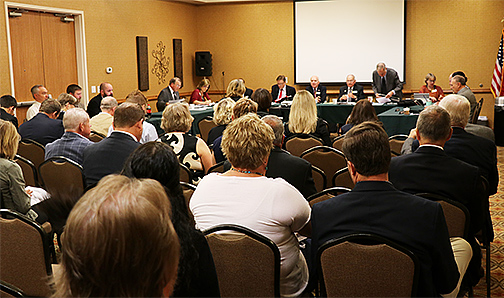AARP Hearing Center

CHEYENNE - The Wyoming Legislature’s Joint Revenue Committee met ahead of February’s budget session Dec. 4-5 in Cheyenne, to look for cash to fill the state’s empty coffers.
While the agenda suggested a number of tax bills would be considered this week, the committee decided to table a few of the bills until the Consensus Revenue Estimating Group (CREG) could present its revenue estimates for the state in mid-Jan. This meant tabling bills on leisure and hospitality taxes, sales tax on specific services, property tax changes, and sales tax for school construction.
From there it was simple - if the Revenue Committee liked the bill brought before it they would pass it along to the full legislature as a committee bill. If the committee did not like a bill, it would kill the bill as a committee bill, though an individual may still bring it to the 2018 Legislative session, which begins in February. Committee bills are traditionally seen as having been more fully vetted and tend to pass the legislature easier than bills brought by individual Representatives or Senators.
Tobacco And Alcohol Taxes
The one tax bill that will be a committee bill by the full legislature is a tobacco tax increase of one dollar a pack. That tax passed the committee by an 8-6 vote, on the strength of testimony that the increase would both bring in about $30 million annually to the state, as well as the impact the tax increase would have on youth who may be dissuaded by the higher price point of tobacco. The bill was fought by the Smoker Friendly chain of convenience stores, which warned of decreased business in Wyoming, leading to job losses in their chain of 20 Wyoming stores. The Wyoming Liquor Association, The Wyoming Taxpayers Association, and the Wyoming Petroleum Association, among others, also opposed the tax on grounds of it being regressive - meaning it would disproportionately impact lower income Wyomingites - and the potential that it could lead to more employee theft, as well as bootlegging cigarettes from other states.
The tobacco tax was the one “sin tax,” that made it through. Wyoming hasn’t changed it’s beer tax since 1936. If a change is to come in 2018, it will have to be done through an individually-sponsored bill, as the Joint Revenue Committee voted down an 18 cents per gallon increase in the malt beverage tax by a 3-10 vote.
Tourism Tax
One bill being considered would force Wyomingites to pay a little more each time they go out to eat, or grab a drink. A leisure and hospitality tax has been proposed that would go towards funding the state’s Department of Travel and Tourism, which is tasked with marketing Wyoming to folks outside the state. Currently, Travel and Tourism is funded from the state’s general fund. This tax would raise around $17 million per year, according to budget estimates.
The tax would be 1 percent added to sales of tourism activities including stays in hotels, casinos, RV camps, restaurants, bars, spectator sports, arts events, museums, and even bowling. The state department of tourism suggests 80 percent of the cash coming from this tax will be from those visiting Wyoming. There is a backlash from some who suggest the tax would be a yoke for Wyoming residents who will be asked to pay more to fund advertising for specific areas of the state. State Senate President Eli Bebout has said he would prefer a 4 percent statewide lodging tax instead..
Municipal Option Tax
Another tax that did die - at least in the form of a committee bill, during the Revenue Committee’s Dec. 4-5 meeting was an optional municipal tax, which would allow communities to tax themselves outside of a county-wide tax. The prevailing argument was country dwellers would be asked to pay a tax they didn’t get the chance to vote on, should a local community choose to raise its sales tax. The other concern from the state’s county commissioners is that there would be little incentive for city voters to approve county projects if the cities were taxing themselves for projects inside their own communities.
From here, the Revenue Committee will reconvene on Jan. 23 in Cheyenne ahead of the legislative session for one final time. The committee will then decide if they want to sponsor bills that increase property taxes, as well as remove tax exemptions on services, such as accounting, and legal services from sales tax.
AARP Wyoming members are encouraged to let the state office know how they feel about various tax increases by contacting the AARP Wyoming office at 307-432-5802.































































